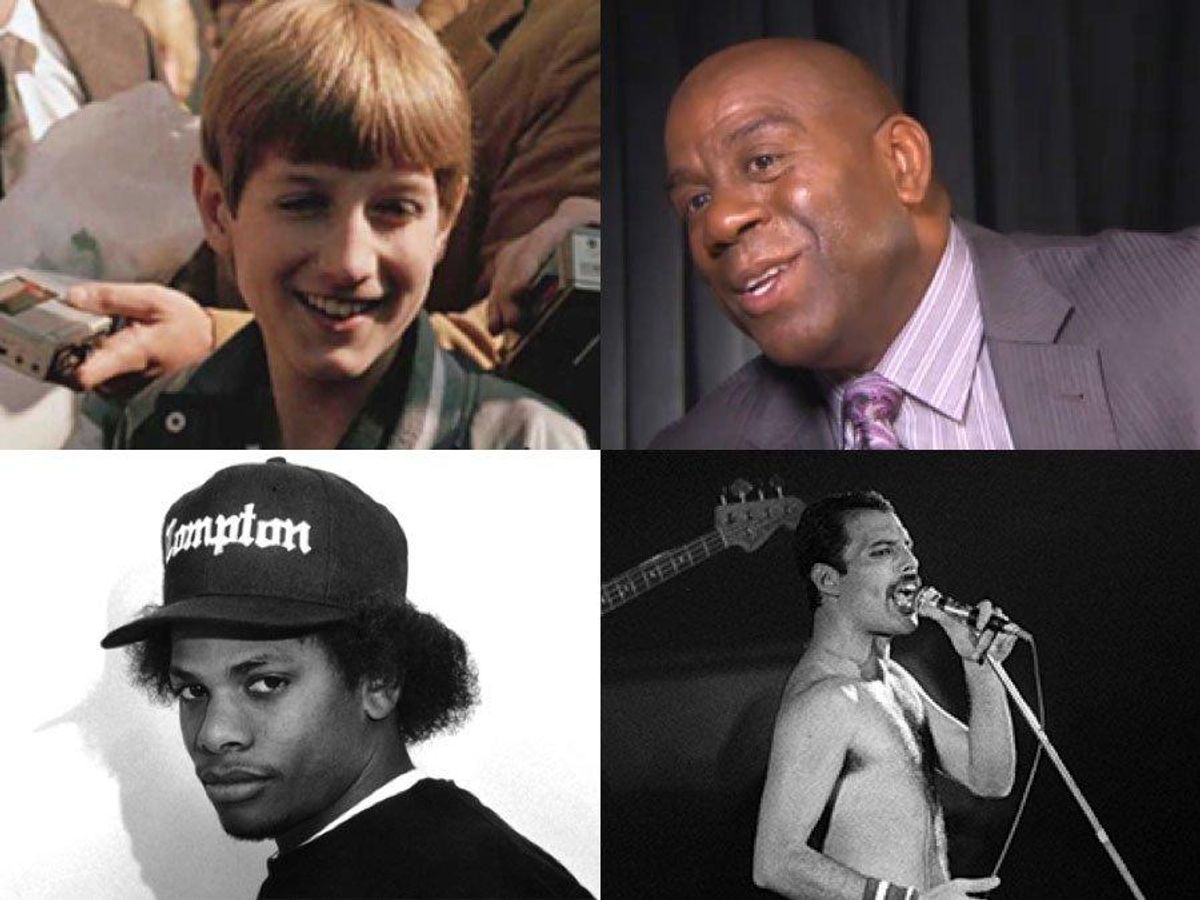
Treatment GuideJust DiagnosedSex & DatingAfrican AmericanStigmaAsk the HIV DocPrEP En EspañolNewsVoicesPrint IssueVideoOut 100
CONTACTCAREER OPPORTUNITIESADVERTISE WITH USPRIVACY POLICYPRIVACY PREFERENCESTERMS OF USELEGAL NOTICE
© 2025 Pride Publishing Inc.
All Rights reserved
All Rights reserved
Scroll To Top
By continuing to use our site, you agree to our Private Policy and Terms of Use.
In the last few weeks, Charlie Sheen's HIV diagnosis has brought increased attention back to the HIV/AIDS pandemic—at least for those who don't live with the disease on a daily basis. While Sheen's admission was powerful and much needed, he represents only the latest figure to increase social consciousness on the issue. Here are six men who changed the face of HIV/AIDS helping us all to understand it's indiscriminate impact.
Rock Hudson
Hollywood leading man, Rock Hudson, was a staple on screens throughout the '50s and '60s. Upon his death on Oct. 2, 1985, much of the public was shocked to know that he was gay and that he had contracted HIV. He became the first well-known celebrity to die from AIDS.
The moment was major for him as he had spent much of his life hiding his sexual orientation from the public for fear that it would ruin his career, and possibly his legacy. Thanks to his admission, though stigma continued, there was increased emphasis on funding for AIDS research and charities after the fact.
Ryan White
Ryan White was a teenager who became one of the earliest youth and hemophiliac cases during the early years of the AIDS pandemic. He acquired the disease from from a contaminated blood treatment and upon diagnosis was given six months to live.
White’s case rose to prominence when his school, Western Middle School in Russiaville, Ind., recieved pressure from parents and faculty to ban him from returning to the school. His family eventually moved to another town and school and he was greeted by people educated about the disease.
White became known as a poster child for the movement focusing on more AIDS research and awareness. He appeared on TV shows, in interviews, testified before the U.S. Government, spoke with former President Ronald Reagan numerous times, gained the support of celebrities and even played a part in a popular TV movie about his life.
He died on March 29, 1990 from complications but his legacy still lives on through many charities and predominantly through the Ryan White Care Act, the largest federally funded program for people living with HIV/AIDS. It was passed just four months after his death.
David Kirby
As late as the '90s, the average American had very little idea of just how gristly AIDS was. A major moment of visibility came when photographer Therese Frare captured David Kirby on his deathbed surrounded by his family.
Kirby had been a gay activist in the '80s and understood the importance of documenting the harsh realities of AIDS at the time. He and his family agreed for the photo to be released and in November 1990 it was featured on the cover of LIFE magazine. This was just several months after his death on May 5, 1990.
Naturally, the graphic image captures audiences and received a fair amount of criticism, but after more than 20 years since the photo’s released, it’s estimated that nearly one billion people have seen it through TV shows, magazines and newspapers.
Frare went on to continue documenting the AIDS crisis, check out more of her work here.
Freddie Mercury
Queen frontman Freddie Mercury held his AIDS diagnosis close to his heart for years until just before his death. Despite hounding from the paparazzi and journalists about his condition, he didn’t confirm his status until just a day before his death.
For years he swore those closest to him to secrecy and continued performing and recording music until it was impossible to continue. Despite his sexuality always being a topic of interest by the general public, he was the first major rock star to make a statement on the disease and, unfortunately, succumb to it.
Magic Johnson
Earvin "Magic" Johnson, was a major Lakers basketball player in the '80s, winning five championships during his tenure. In 1991, he held a press conference and revealed his HIV status along with an announcement of his retirement.
His openness shifted the mainstream conversation of AIDS being a strictly white, gay epidemic. It was important that he set the tone because the Black community today continues to be at ever high risk for HIV diagnoses than most other populations, regardless of sexual orientation.
Johnson continues to be a testament that those living with HIV can live long, healthy lives with effective health care and owning their status.
Eazy-E
Profiled in the recent NWA biopic, Straight Outta Compton, rapper Eazy-E’s diagnosis sent shockwaves through the hip-hop industry. The revered musician (and his groupmates) were rap titans and he represented a realer face of the Black community upon the reveal in 1995.
As a straight man in the often hypermasculine arena of rap, his death brought attention in a very real way to the high numbers of Black HIV infections rates that continue to exist today.
From our Sponsors
Most Popular
Lexi Love comes out as HIV+ after Trump deletes federal resources
January 23 2025 11:23 AM
Ricky Martin delivers showstopping performance for 2024 World AIDS Day
December 05 2024 12:08 PM
Meet our Health Hero of the Year, Armonté Butler
October 21 2024 12:53 PM
This long-term HIV survivor says testosterone therapy helped save his life.
December 16 2024 8:00 PM
California confirms first case of even more deadly mpox strain
November 18 2024 3:02 PM
Plus: Featured Video
Latest Stories
The Talk Season 5 premieres this spring with HIV guidance for the newly diagnosed
March 26 2025 1:00 PM
BREAKING NEWS: Trump admin moves to end federal HIV prevention programs
March 18 2025 6:10 PM
Trump's orders prompt CDC to erase HIV resources
January 31 2025 5:29 PM
Plus nominated for 2025 GLAAD Media Award
January 22 2025 12:42 PM
Hollywood must do better on HIV representation
December 01 2024 9:00 AM
Check out our 2024 year-end issue!
October 28 2024 2:08 PM
Twice-yearly injectable lenacapavir, an HIV-prevention drug, reduces risk by 96%
October 15 2024 5:03 PM
Discover the power of Wellness in your life
March 26 2025 12:41 PM
Season 4 of The Switch on resilience & radical self-love returns this spring
March 26 2025 12:20 PM
Gerald Garth is keeping people of color happy and healthy through trying times
March 11 2025 3:38 PM
Tyler TerMeer vows to continue to fight for health care for all
January 28 2025 3:00 PM
A camp for HIV-positive kids is for sale. Here's why its founder is celebrating
January 02 2025 12:21 PM
AIDS Memorial Quilt displayed at White House for the first time
December 02 2024 1:21 PM
Climate change is disrupting access to HIV treatment
November 25 2024 11:05 AM
Jess King is here to help you live your happiest, healthiest life yet
March 24 2025 4:35 PM
Celebrating Black History Month with our annual African American issue
February 01 2025 3:28 PM
'RuPaul's Drag Race' star Trinity K Bonet quietly comes out trans
December 15 2024 6:27 PM
Decades of progress, uniting to fight HIV/AIDS
December 01 2024 12:30 PM
Post-election blues? Some advice from mental health experts
November 08 2024 12:36 PM
AIDS/LifeCycle is ending after more than 30 years
October 17 2024 12:40 PM
















































































